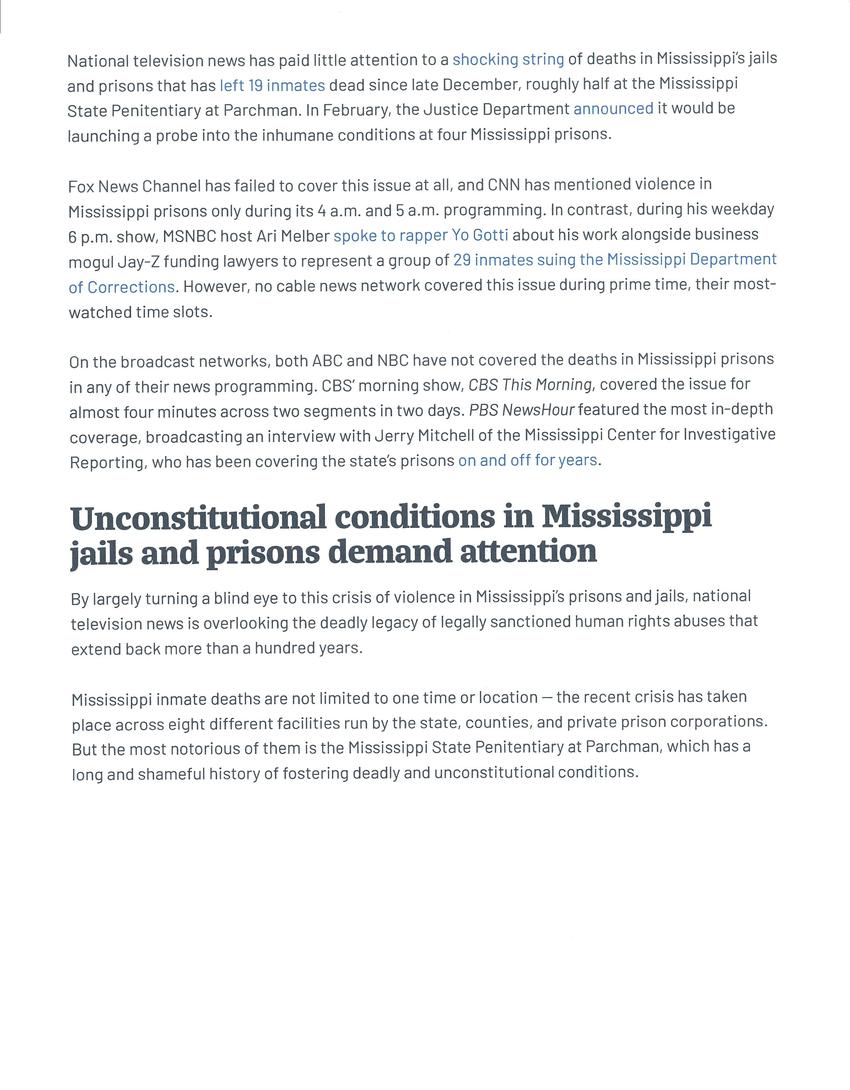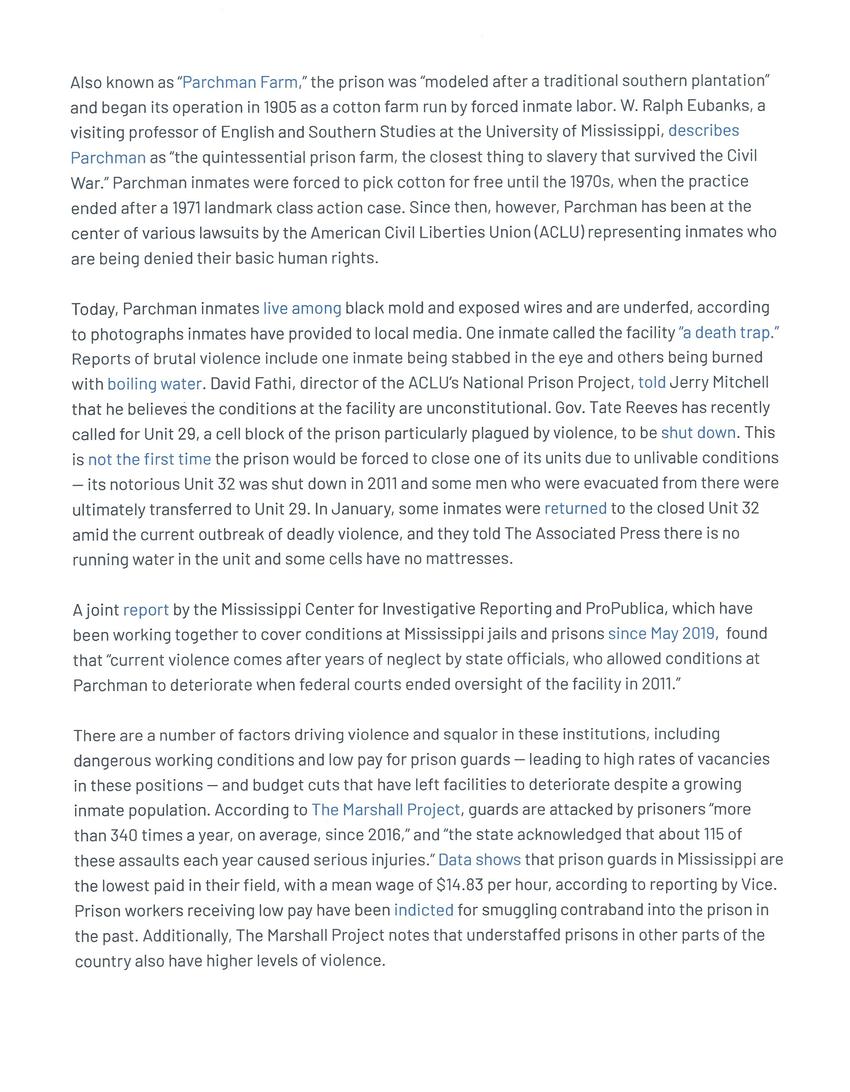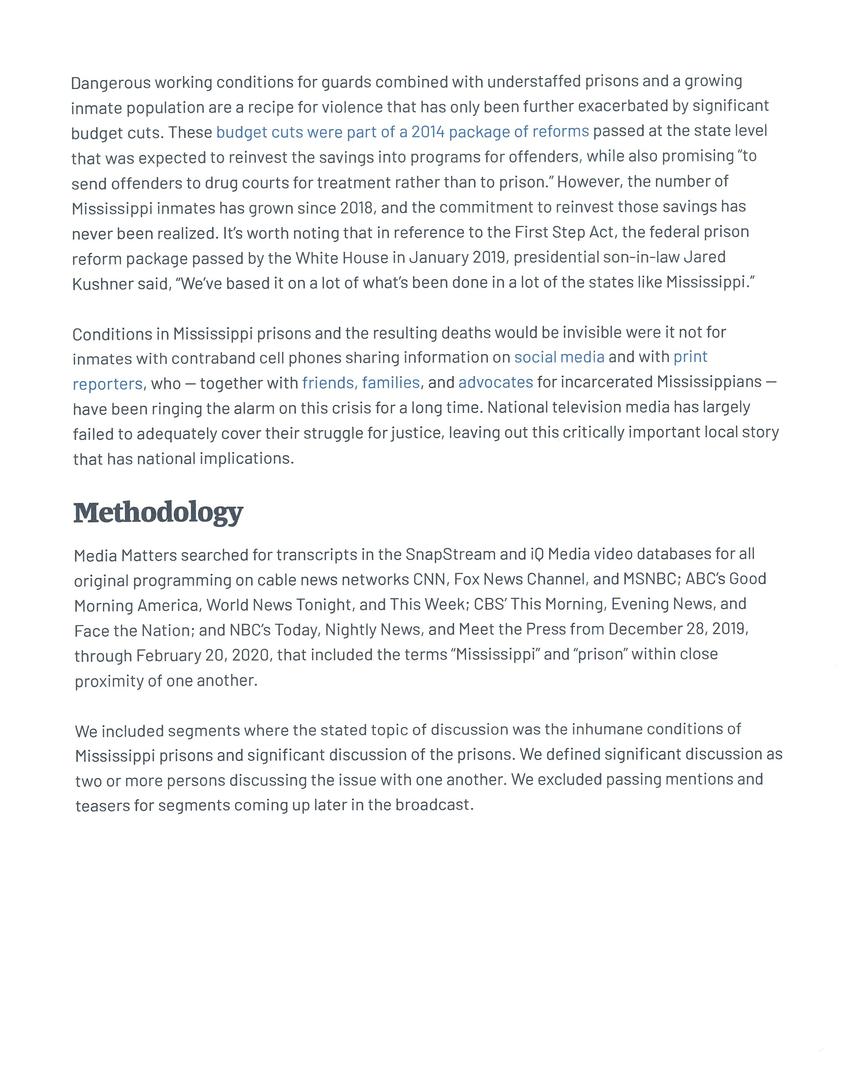Television News Has Largely Failed To Cover Deadly Conditions In Mississippi Jails And Prison

Transcription
https://www.mediamatters.org/crime-and-criminal-justice/television-news-has-largely-failed-cover-crisis-mississippi-jails-and
Television news has largely failed to cover deadly conditions in Mississippi jails and prisons
At least 19 inmates have died in state facilities in just two months
WRITTEN BY MADELINE PELTZ
PUBLISHED 02/21/20 12:58 PM EST
National television news has paid little attention to a shocking string of deaths in Mississippi’s jails and prisons that has left 19 inmates dead since late December, roughly half at the Mississippi State Penitentiary at Parchman. In February, the Justice Department announced it would be launching a probe into the inhumane conditions at four Mississippi prisons.
Fox News Channel has failed to cover this issue at all, and CNN has mentioned violence in Mississippi prisons only during its 4 a.m. and 5 a.m. programming. In contrast, during his weekday 6 p.m. show, MSNBC host Ari Melber spoke to rapper Yo Gotti about his work alongside business mogul Jay-Z funding lawyers to represent a group of 29 inmates suing the Mississippi Department of Corrections. However, no cable news network covered this issue during prime time, their most-watched time slots.
On the broadcast networks, both ABC and NBC have not covered the deaths in Mississippi prisons in any of their news programming. CBS’ morning show, CBS This Morning, covered the issue for almost four minutes across two segments in two days. PBS NewsHour featured the most in-depth coverage, broadcasting an interview with Jerry Mitchell of the Mississippi Center for Investigative Reporting, who has been covering the state’s prisons on and off for years.
Unconstitutional conditions in Mississippi jails and prisons demand attention
By largely turning a blind eye to this crisis of violence in Mississippi’s prisons and jails, national television news is overlooking the deadly legacy of legally sanctioned human rights abuses that extend back more than a hundred years.
Mississippi inmate deaths are not limited to one time or location -- the recent crisis has taken place across eight different facilities run by the state, counties, and private prison corporations. But the most notorious of them is the Mississippi State Penitentiary at Parchman, which has a long and shameful history of fostering deadly and unconstitutional conditions.
Also known as “Parchman Farm,” the prison was “modeled after a traditional southern plantation” and began its operation in 1905 as a cotton farm run by forced inmate labor. W. Ralph Eubanks, a visiting professor of English and Southern Studies at the University of Mississippi, describes Parchman as “the quintessential prison farm, the closest thing to slavery that survived the Civil War.” Parchman inmates were forced to pick cotton for free until the 1970s, when the practice ended after a 1971 landmark class action case. Since then, however, Parchman has been at the center of various lawsuits by the American Civil Liberties Union (ACLU) representing inmates who are being denied their basic human rights.
Today, Parchman inmates live among black mold and exposed wires and are underfed, according to photographs inmates have provided to local media. One inmate called the facility “a death trap.” Reports of brutal violence include one inmate being stabbed in the eye and others being burned with boiling water. David Fathi, director of the ACLU’s National Prison Project, told Jerry Mitchell that he believes the conditions at the facility are unconstitutional. Gov. Tate Reeves has recently called for Unit 29, a cell block of the prison particularly plagued by violence, to be shut down. This is not the first time the prison would be forced to close one of its units due to unlivable conditions -- its notorious Unit 32 was shut down in 2011 and some men who were evacuated from there were ultimately transferred to Unit 29. In January, some inmates were returned to the closed Unit 32 amid the current outbreak of deadly violence, and they told The Associated Press there is no running water in the unit and some cells have no mattresses.
A joint report by the Mississippi Center for Investigative Reporting and ProPublica, which have been working together to cover conditions at Mississippi jails and prisons since May 2019, found that “current violence comes after years of neglect by state officials, who allowed conditions at Parchman to deteriorate when federal courts ended oversight of the facility in 2011.”
There are a number of factors driving violence and squalor in these institutions, including dangerous working conditions and low pay for prison guards -- leading to high rates of vacancies in these positions -- and budget cuts that have left facilities to deteriorate despite a growing inmate population. According to The Marshall Project, guards are attacked by prisoners “more than 340 times a year, on average, since 2016,” and “the state acknowledged that about 115 of these assaults each year caused serious injuries.” Data shows that prison guards in Mississippi are the lowest paid in their field, with a mean wage of $14.83 per hour, according to reporting by Vice. Prison workers receiving low pay have been indicted for smuggling contraband into the prison in the past. Additionally, The Marshall Project notes that understaffed prisons in other parts of the country also have higher levels of violence.
Dangerous working conditions for guards combined with understaffed prisons and a growing inmate population are a recipe for violence that has only been further exacerbated by significant budget cuts. These budget cuts were part of a 2014 package of reforms passed at the state level that was expected to reinvest the savings into programs for offenders, while also promising “to send offenders to drug courts for treatment rather than to prison.” However, the number of Mississippi inmates has grown since 2018, and the commitment to reinvest those savings has never been realized. It’s worth noting that in reference to the First Step Act, the federal prison reform package passed by the White House in January 2019, presidential son-in-law Jared Kushner said, “We’ve based it on a lot of what’s been done in a lot of the states like Mississippi.”
Conditions in Mississippi prisons and the resulting deaths would be invisible were it not for inmates with contraband cell phones sharing information on social media and with print reporters, who -- together with friends, families, and advocates for incarcerated Mississippians -- have been ringing the alarm on this crisis for a long time. National television media has largely failed to adequately cover their struggle for justice, leaving out this critically important local story that has national implications.
Methodology
Media Matters searched for transcripts in the SnapStream and iQ Media video databases for all original programming on cable news networks CNN, Fox News Channel, and MSNBC; ABC’s Good Morning America, World News Tonight, and This Week; CBS’ This Morning, Evening News, and Face the Nation; and NBC’s Today, Nightly News, and Meet the Press from December 28, 2019, through February 20, 2020, that included the terms “Mississippi” and “prison” within close proximity of one another.
We included segments where the stated topic of discussion was the inhumane conditions of Mississippi prisons and significant discussion of the prisons. We defined significant discussion as two or more persons discussing the issue with one another. We excluded passing mentions and teasers for segments coming up later in the broadcast.
Other posts by this author
|
2023 may 31

|
2023 mar 20

|
2022 aug 23

|
2022 aug 23

|
2022 aug 23

|
2022 aug 23

|
More... |





Replies